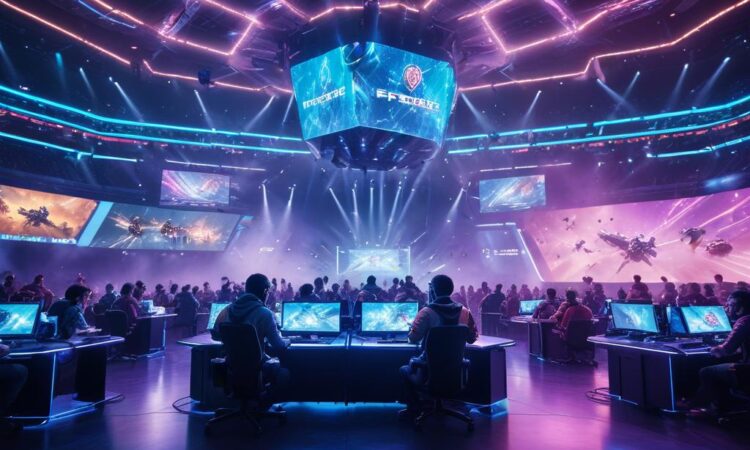Esports and the Future of Gaming: Predicting the Long-Term Trends
The world of esports is evolving at a breakneck pace, captivating audiences and transforming the gaming industry. As we stand on the precipice of a new era, it’s crucial to examine the long-term trends shaping this dynamic landscape. From the emergence of new genres to the integration of cutting-edge technology, the future of esports is brimming with exciting possibilities.
The Rise of New Genres: Expanding the Esports Arena
The traditional esports scene has been dominated by genres like first-person shooters (FPS), multiplayer online battle arenas (MOBAs), and real-time strategy (RTS). However, the esports landscape is expanding to embrace diverse genres, offering a broader range of competitive experiences:
- Battle Royale: Games like Fortnite, PUBG, and Apex Legends have exploded in popularity, captivating players with their high-stakes, last-man-standing gameplay. Their accessibility and diverse skill sets have fueled a thriving esports scene.
- Fighting Games: Long a staple of the arcade scene, fighting games are experiencing a resurgence in esports. Titles like Street Fighter V, Tekken 7, and Super Smash Bros. Ultimate showcase fast-paced, technical gameplay and exhilarating tournaments.
- Sports Simulators: The realism and strategic depth of sports simulators like FIFA, NBA 2K, and MLB The Show have attracted a dedicated esports fanbase. Virtual sports are becoming increasingly popular, offering fans a unique way to experience the thrill of competition.
- Auto Racing: Sim racing has gained immense traction in recent years, with titles like iRacing and Assetto Corsa Competizione attracting professional drivers and sim racing enthusiasts alike. The realism and competitive nature of these games have made them a compelling addition to the esports world.
This diversification of genres not only expands the audience reach of esports but also opens up new opportunities for developers and players. As more genres enter the competitive arena, the esports landscape becomes more inclusive and accessible, encouraging a wider range of talents to flourish.
Technological Innovations: Revolutionizing Esports
Technology plays a pivotal role in the evolution of esports, driving innovation and enhancing the spectator experience. From advanced streaming platforms to immersive virtual reality (VR) experiences, technological advancements are shaping the future of esports:
- Cloud Gaming: The rise of cloud gaming platforms like Google Stadia and xCloud eliminates the need for powerful hardware, allowing players to access high-quality esports experiences on various devices. This accessibility opens up esports to a wider audience and fosters a more inclusive gaming community.
- Virtual Reality (VR): VR is transforming the esports landscape by offering immersive experiences for players and spectators alike. VR games provide a unique level of immersion and engagement, while VR broadcasting allows viewers to experience the action from a player’s perspective.
- Artificial Intelligence (AI): AI is playing an increasingly prominent role in esports, from analyzing player performance to optimizing gameplay. AI-powered coaching tools and automated commentating systems are enhancing the spectator experience and improving the overall quality of esports competitions.
- Blockchain and NFTs: The integration of blockchain technology and non-fungible tokens (NFTs) is revolutionizing the esports economy. NFTs are being used to create unique digital assets, such as in-game items and collectible cards, providing players with ownership and liquidity in the digital world.
These technological innovations are not only pushing the boundaries of esports but also paving the way for a more accessible, immersive, and financially rewarding gaming experience for players and fans alike.
Evolving Relationship Between Esports and Traditional Sports
The lines between esports and traditional sports are blurring, creating a symbiotic relationship that benefits both industries:
- Cross-Promotion and Collaboration: Traditional sports organizations are increasingly embracing esports, launching their own teams and partnering with esports organizations. This cross-promotion generates new revenue streams and exposes both industries to a wider audience.
- Talent Exchange: The talent pool is expanding, with athletes transitioning from traditional sports to esports and vice versa. This exchange of skills and expertise enriches both disciplines and creates exciting opportunities for athletes.
- Shared Infrastructure and Resources: Esports organizations are leveraging the infrastructure and resources of traditional sports, such as stadiums and broadcast facilities, to elevate the production value of their events. This collaboration streamlines operations and provides access to a wider audience.
- Shared Values: Esports and traditional sports share core values of competition, teamwork, and sportsmanship. This common ground fosters a sense of community and enhances the overall experience for athletes and fans.
The convergence of esports and traditional sports is creating a vibrant and dynamic ecosystem, where both industries learn from each other and collaborate to reach new heights.
Challenges and Opportunities
While the future of esports looks bright, there are challenges that need to be addressed:
- Sustainability and Professionalism: Ensuring the long-term sustainability of esports requires addressing issues such as player salaries, tournament structures, and fan engagement. Developing a more professionalized approach will foster a stable and thriving ecosystem.
- Regulation and Governance: The lack of consistent regulation and governance across different regions can create challenges for esports organizations and players. Establishing clear rules and standards will ensure fairness and transparency in the industry.
- Accessibility and Inclusion: Making esports accessible to a wider audience requires addressing issues of gender, ethnicity, and socioeconomic background. Creating a more inclusive environment will foster a more diverse and vibrant esports community.
Despite these challenges, the opportunities for esports are vast. The global esports market is expected to continue its rapid growth, driven by factors such as technological advancements, increased media coverage, and growing fan engagement.
The Future of Esports: A Bold and Exciting Landscape
The future of esports is bright, promising a new era of innovation, competition, and entertainment. As new genres emerge, technology advances, and the relationship with traditional sports evolves, the esports landscape is poised for explosive growth. By addressing the challenges and capitalizing on the opportunities, the esports industry can create a sustainable, engaging, and inclusive future for players, fans, and developers alike.

